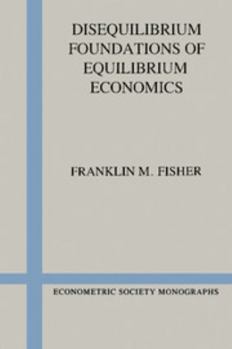Disequilibrium Foundations of Equilibrium Economics
(Book #6 in the Econometric Society Monographs Series)
Select Format
Select Condition 
Book Overview
The most common mode of analysis in economic theory is to assume equilibrium. Yet, without a proper theory of how economies behave in disequilibrium, there is no foundation for such a practice. The first step in such a foundation is a theory of stability, and this book is primarily concerned with that subject. The author first reviews the older literature on the stability of general equilibrium and goes on to consider a more satisfactory general model in which agents realize that they are in disequilibrium and act on arbitrage opportunities. Topics explored along the way include optimal arbitrage behavior, the relation of perceived monopoly power to quantity constraints, and the role of money.
Format:Paperback
Language:English
ISBN:0521378567
ISBN13:9780521378567
Release Date:March 1989
Publisher:Cambridge University Press
Length:252 Pages
Weight:0.80 lbs.
Dimensions:0.6" x 6.0" x 9.0"
Customer Reviews
0 rating





